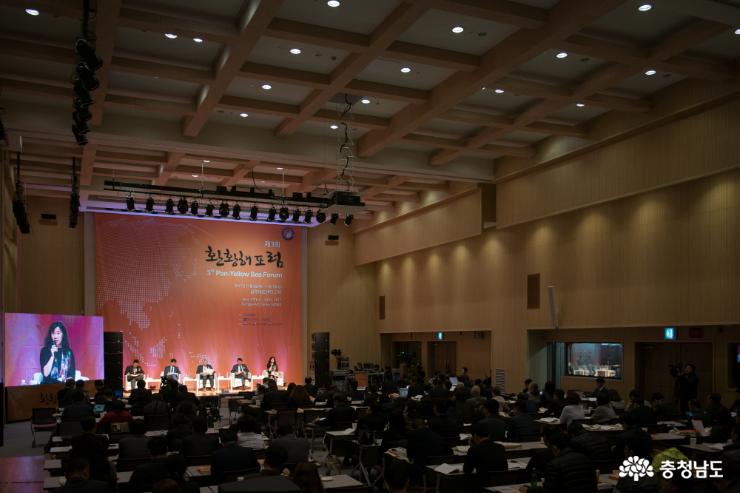About Chungnam
News
“Asian Peace Community” looks after roles of local government
“3rd Pan-Yellow Sea Forum” held at Gongju Art Center (GOMA) from Nov. 2-3
2017.12.13(수) 10:09:26 | CNnews (![]() chungnamdo@korea.kr)
chungnamdo@korea.kr)

▲ Opening address at the 3rd Pan-Yellow Sea Forum held in Gongju Art Center GOMA (debate session)
As tension and a sense of crisis heighten due to North Korean nuclear and THAAD issues, Chungcheongnam-do held the 3rd Pan-Yellow Sea Forum at Gongju Art Center GOMA from November 2nd to 3rd, in an attempt to realize peace and coexistence through pending marine, environmental and industrial issues.
Jointly hosted by the East Asia Foundation and Chungnam Institute, this forum provided an opportunity to examine the roles of local governments for a “formation of Asian peace community.”
The ceremony held on the 2nd started off with an opening address by An Heejung, Governor of Chungcheongnam-do, followed by a keynote speech by Moon Chung-in, the President’s special advisor on unification, diplomacy and national security affairs (honorary professor at Yonsei University), on “Moon Jae-in regime’s diplomatic and national security policies and Pan-Yellow Sea peace vision” through which Mr. Moon drew attention to the meaning of peace in the Pan-Yellow Sea region under the circumstances that the Korean Peninsula is currently exposed to.
In the following special session on the topic of “Improvement in the Korea-China relationship and Pan-Yellow Sea peace,” a discussion on ways to improve Korea-China relations that had been exacerbated by the THAAD issue.
Professor Kim Hong-gyu of Ajou University served as an emcee and, followed by Governor Ahn’s keynote presentation, a debate ensued among Kim Sung-hwan, former Minister of Foreign Affairs and Trade; Shin Jung-seung, former Ambassador of the Republic of Korea to China; and Zhang Huizhi, head of Korea Research Institute at Jilin University.
Afterwards, the main session proceeded with three topics: peace, prosperity and coexistence. In the first session of Peace, a discussion took place under the subject of “Ways to design and achieve West Sea Peace Cooperation Zone” to talk about the means to transform the West Sea region into a foundation for peace and cooperation.
During this session, Congressman Kim Jong-dae, widely seen as a military security expert, and Dr. Robert Carlin who had previously working as an analyst of issues concerning the Korean Peninsula while working at the CIA in the US, etc. for a long time and researching for the West Sea Peace Cooperation Zone, were invited to examine a process that could be materialized for the formation of West Sea Peace Cooperation Zone.
In the second session of Peace, the topic of “Pan-Yellow Sea strategies to resolve historical conflicts” was discussed in an attempt to close the gap in perception of history among Korea, China and Japan and to explore the three nations’ common cultural identity. In the 1st session of Prosperity under the subject of “Ways to create jobs through fostering of small and medium-sized businesses: the role of local government,” the means to develop local-based small and medium-sized venture firms, which account for a significant percentage of our economy, were sought and similar cases overseas were also examined.
In the second session of Prosperity that talked about “Strategies to link port infrastructure and a transportation network that opens up Pan-Yellow Sea age,” Chungcheongnam-do’s opportunities and ways to become the hub of Korean Peninsula’s transportation and logistics through linking of port infrastructure and a transportation network.
In the first session of Coexistence, the subject of “Joint management and cooperation measures in use of fishery resources in the Yellow Sea” was discussed among Korea, China and Japan, three nations that are directly and indirectly related to the waters of the Pan-Yellow Sea, to talk about ways to respond together on pending issues such as illegal operation issues and the global fishery market.
In the second session of Coexistence, the subject of “Ways to manage fine dust for improvement in air quality” was discussed to share the conditions of fine dust generation and pollution and investigate not only the current status on fine dust released in regions neighboring the Pan-Yellow Sea such as Chungcheongnam-do but also the means to cooperate for the reduction of fine dust.
On the 3rd, the second and final day of the forum, the event was filled with special materials including the stories of young artists in the local community. The 2nd special session, “Age of local extinction, youth dreaming of a new future in local society,” the stories of young artists who dream of changes and vitalization of the local community through art were asked to talk about difficulties and future possibilities that local community art movements are facing.
In the 3rd and final special session, “A roundtable for sustainable cooperation among Korean, Chinese and Japanese think-tanks,” the means of exchanges and cooperation among Korean, Chinese and Japanese local governments’ think-tanks were sought.
Meanwhile, the Pan-Yellow Sea Forum aims to ascertain the proper role of local governments in a global era and provide the foundation for the Pan-Yellow Sea to be born again as the Mediterranean of Asia. For questions regarding the forum, please contact Chungcheongnam-do’s Pan-Yellow Sea Team (041-635-3965, 2912).




